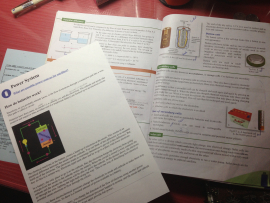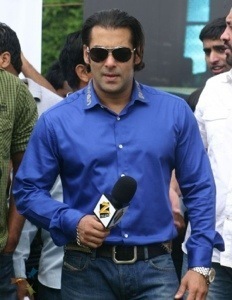Ravi Subramanian's Blog, page 5
October 28, 2013
A Q&A with bestselling author Ravi Subramanian AND a giveaway of Bankerupt
 Reblogged from Fortyoneandcounting:
Reblogged from Fortyoneandcounting:


When I first met Ravi at Preeti Shenoy's Mumbai launch of her book The Secret Wish List, I realised that he wore his achievements very very lightly. To quote from Wikipedia, which is now THE authoritative source on everything and everyone, "A banker by profession, Subramanian has written four popular thrillers about banking and bankers, including the Economist Crossword Book Award…
A few days back I did a Q&A with Kiran Manral : Famous author, blogger and a wonderful human being. Find it right here.....
October 19, 2013
How do we get our children to read ?
 Yesterday I was asked a very interesting question by Jaya Bhattacharji Rose, a friend. It was about my daughter Anusha. “How did you get Anusha to become such a voracious reader?” she asked me. I didn’t have an answer. Honestly if I look back at the last 13 years of Anusha’s life, the only thing that Dharini (my wife) and I did was introduce her to books, and thereon kept supplying her with a steady stream of books. We didn’t try to influence her choice of books though we did censor the kind of books she read. And now she gobbles up three books in two weeks. (Well almost …. because if a new Rick Riordan book comes out, she reads it so very slowly in order to make it last as long as possible)
Yesterday I was asked a very interesting question by Jaya Bhattacharji Rose, a friend. It was about my daughter Anusha. “How did you get Anusha to become such a voracious reader?” she asked me. I didn’t have an answer. Honestly if I look back at the last 13 years of Anusha’s life, the only thing that Dharini (my wife) and I did was introduce her to books, and thereon kept supplying her with a steady stream of books. We didn’t try to influence her choice of books though we did censor the kind of books she read. And now she gobbles up three books in two weeks. (Well almost …. because if a new Rick Riordan book comes out, she reads it so very slowly in order to make it last as long as possible)
In my opinion most children will read if introduced to books at the right age and time, and if they are allowed to read books that they want to. So here I am, giving my first parenting advice on how to get children to read. A lot of it is gut feel and common sensical. As parents, if you don’t agree, its perfectly fine, do your own thing. I am only outlining things which worked for me.
1. Don’t thrust the reading habit on children : Children these days have a mind of their own. And often they are smarter and quicker than their parents. They don’t like to be told things. If you try to thrust reading on children, you can be sure of one thing, they will not read.
2. Children learn by looking at their parents : If the parents don’t read, convincing children to read is going to be slightly difficult, if not impossible. If you want your children to read, start reading yourself. Atleast one of the parents must do so if you are serious about developing a reading habit in your child.
3. Make it cool : Children these days like to do things which are cool. Things which add value to their bragging quotient at school. While reading can be cool, it can be geeky too. The latter is a bit of a put off. Help children read books which are the “in-thing”.. which get discussed in school. A lot of parents cringed when Wimpy Kids came out, but who would have thought a few years back that the Wimpy Kids series will push Jeff Kinney into the list of highest grossing authors in 2012. A number of kids read them and liked those books. Same with Geronimo Stilton. Let children read contemporary stuff. Don’t push them to classics. If you have to… then negotiate. For every two Wimpy kid or Rick Riordan books, they will have to read one classic. I am not not sure that this strategy will work, but worth a try.
4. Do not draw up a schedule for reading : Library hour never worked in school, why do you think it will work at home? Many so called child psychologists have suggested that its best to set aside an hour a day for reading. Trust me, if you do that, the child will dread the ‘reading hour’. I have found that the best time to read is before going to bed. 90% of the reading population reads on bed. Why not children? Let them read before going to sleep. If they read, and are engrossed, let them knock off 15-20 minutes of their sleeping time and continue reading. Its a good habit. Yes they will lose a bit of sleep. But what the hell, there is more fun in going to sleep late, despite “mom imposed” sleeping time. And this fun element will also get them to enjoy reading. Long term gains. remember. (and btw Dharini will kill me if she reads this)
5. Sign up for a library and let children order themselves : This is exciting. I signed up for Librarywala, and Anusha ordered her own books. Yes, we censored the books to make sure that she read books appropriate for her age. But over the last two years, in our family, she is the one who has ordered the maximum number of books from Librarywala. This also becomes relevant because of the fact that children these days are very choosy. They have a very short attention span and very strong likes and dislikes. If you keep buying books, you will get frustrated with the fact that for every five books you buy for them, they will junk one or two. In such a scenario, a library works well. And there are lot of good ones these days : Easylib, Kwench, Librarywala, Justbooks are only a few of them.
6. If you are one of those privileged ones for whom affordability is not the issue, it might make sense to make your child future ready by getting him or her to read on the Kindle. Ebooks will rule the world in another five years (by the time your child grows up). No harm in making sure the child enjoys the benefits of technology. The instant ‘word look up’ option that most ebook readers give you will surely be instrumental in improving your child’s vocabulary. (in a paperback, its too much of an effort to pick up the dictionary and get to know the meaning of difficult words). And ebook readers are definitely ‘cooler’.
7. Encourage your children to exchange books: I have seen Anusha read some books multiple times.But these are books she loves. (at best 10% of the books she reads). The balance 90% are never read again. I am sure the same is the case with most other children too. Do not sell such books to the Kabadiwala. Either exchange these books with other children or else donate them to a library or a foundation which supports reading. It will help another child read and develop the habit. More importantly it will also develop the habit of sharing in your child.
People tell me that reading to a child works. I do not have much of an experience at that, so not sure if it works.
A few days back, in an interview with Radio City in Bangalore, I was asked if i have any message for the people of Bangalore. All I said there was that reading is a great habit, which our children must cultivate. It makes them develop as well rounded individuals and broadens their horizons. It improves vocabulary, and can possibly make them more confident. Hence if we have to pass on one trait to our children, let it be the habit of reading. Its like breathing, like walking, like swimming, like cycling. Once you develop the passion for reading, you will never get out of it. And what better an age to get into it, than your formative years.
God Bless all our children.
Pic courtesy: Guidingstar.ca

October 17, 2013
Literary Fiction or Commercial Fiction
Over the last few weeks as I have gone around promoting BANKERUPT, I have been asked many questions. Some interesting, some not so interesting. Some probing, some not so probing. Some embarrassing, some not so embarrassing. However there was one question, which kept cropping up every now and then. And that was about my views on the so-called categorization of authors as literary and commercial authors.
Here’s what I think about it.
The discussion on what is more important; more fulfilling – Literary or Commercial fiction is a very juvenile discussion. This divide exists because the trade and at times the publishers create it to distinguish between product offerings for various segments of readers. From an authors perspective every book is a result of sweat and toil, and every book written deserves to be read.
Pause for a moment and look at it from a reader’s perspective. The reader wants a good book. A well-written book with a good story which holds his attention. The definition of “what is good” varies from reader to reader. The more the number of readers who feel that a book is good (as per their definition of good), the more commercially successful a book is.
Unfortunately books with easy language have come to be seen as commercial fiction. Don’t forget the fact that writing in simple English is not easy. Just because someone writes in simple English to brand him as a commercial fiction writer is as big a crime as branding someone who writes fabulous English as a literary genius.
There is another element that is paramount in any fiction. Something, which single handedly determines the success or otherwise of a book (even more critical than the prose) – and that is STORY TELLING. In the so-called debate of literary vs. commercial fiction, people seem to be forgetting this aspect in a book. If you are able to tell a story in such a manner that the reader relates to the book, to the characters and to the plot you have a winner on your hands. Irrespective of the category you fit in, if you lack the art of story telling, you will never be commercially successful.
If I had to categorise authors into slots, I would never categorise them as literary authors or commercial authors. I would put each one of them into one of the following two categories : “Good story tellers” or “Poor story tellers”. Trust me, nothing else is important.
As long as you are a good storyteller, whether you are a literary or commercial fiction writer shouldn’t matter… and if you are a poor storyteller, wether you are a literary or commercial fiction writer wouldn’t matter. Period.

August 11, 2013
The PRESSURE of being an Author
Nicholas Sparks once said, “There’s always pressure. A great deal of pressure when writing, since my first books were so successful.”
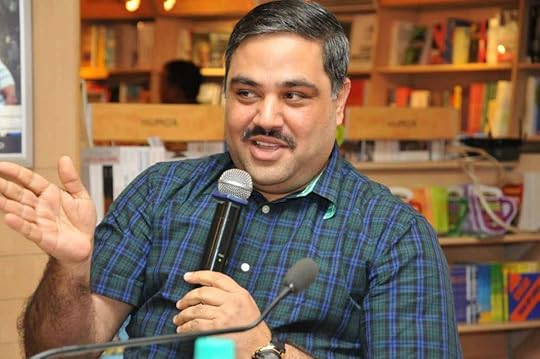
Jeffrey Archer in Jaipur said, “Every time a book of mine comes out, I spend sleepless nights wondering if it will debut on the New York Times, bestseller list …. at #1.”
Every author goes through a phase of nervous anxiety just before a book release. When the biggies in the world of commercial fiction go through this phase, can we all be untouched by this emotion. Obviously not!
Archer may have mastered the art of dealing with this pre-release pressure, but I have a long way to go before I become an expert at camouflaging this pressure. People refer to it by different names – pressure, stress, anxiety, responsibility etc etc. But trust me when i say it, it all means the same – a desire to succeed. A desire to do well. A desire to come good on the faith people have in you.
As I ready myself for the release of BANKERUPT, the pressure is beginning to show. Were things always like this for me? No. Definitely not. Have they changed over the years ? Most certainly… YES!
When If God was a Banker came out six years back, there was absolutely no pressure on me. It was my first book and I had no idea what success looked or felt like. So there was no fear of failure. Success or failure wouldn’t have mattered. All I wanted to do at that stage was to write one book. Thats it.
The success of If God was a Banker changed it all. Pressure walked clandestinely into the pages of my life. Into my writing career.
For me, BANKERUPT brings with it an enormous amount of responsibility and with it comes the pressure for delivery. To make sure that the book does better than my previous books. And its for more reasons than one.
1. Firstly this is my first book with a new publisher – Penguin. My earlier books with Rupa Publications have done well. Despite that I went ahead with Penguin. I have my own professional reasons for that. But change always brings with it a certain amount of apprehension (pressure again). Must confess however that Penguin have been absolutely superlative thus far, and have done everything possible to help me settle into the new relationship.
2. Secondly BANKERUPT is my first book where banking is not the core theme of the book. A step away from financial thrillers to the world of Generic thrillers. While I have done my bit to ensure that this is my “Thrillingest thriller”, its a bit different from my previous ones. And with any new venture comes anxiety (pressure again)
3. As one evolves in the journey as a writer, the commercials involved keep getting more and more significant. The need to make sure that you deliver to the publishers who have shown faith in you, to the readers who have bought your book, to the book stores who order and stock your books in bulk – is a huge responsibility (Pressure). Any author who doesn’t think about this does not deserve to be read.
However I have realised that this pressure is here to stay. It will go away temporarily when the launch phase gets over and I immerse myself in the manuscript of my next book. But the moment that gets done, and gets bundled off to the publisher, the pressure will come back in full force. There is no running away from it.
But of late i have seen an interesting change in me……. I have started enjoying this pressure. Without this pressure, I feel incomplete now.

July 4, 2013
SCREW YOUR VIEW : wrong approach to uncomplimentary book reviews

Writing a book is a matter of an author’s choice, reviews are a matter of a bloggers discretion.
The Bloggers community has been up in arms these days. The issue being the hostile reaction of an author whose work didn’t receive a favourable review. With the exponential increase in the number of Indian authors, the rising influence of social media and the increasing means of reliance on e-promotions for book sales, something like this was waiting to happen.
Writing is a very humbling experience. In this field, an author starts off as a nobody. No background, no stature, no reputation, no clout, no friends, no enemies. Under such a circumstance, feedback that one gets is rarely motivated. It is always honest. If someone who is a complete stranger to an author writes a review about his book, its got to be more valuable than what his friends say. The latter will always give carefully worded feedback, which sounds good to hear. In my six-year journey as an author, I am yet to come across a friend who has rubbished my books. In fact some have even told me, “Sir you write fabulous emails, no wonder you write great books.” Rubbish! If writing great emails made you a good author, all the customer service executives at banks, sending out shitload of mails everyday, would have made it to the bestseller lists.
As an author, one must realize that the best feedback invariably comes from bloggers and people who don’t know you and hence don’t have a reason to be particularly nice (or hostile) to you. The only exclusion to this generalization, is your family.
Let me take you back to June 2007, when If God was a Banker was released. The first review it got was in Mint newspaper – an article by Sanjukta Sharma. The headline of the article was “Don’t bank on it”. My first review, ever, in a leading newspaper was a caustic one. It hurt. And hurt badly. But when you write a book, you put yourself out in public domain. And when you do that, you must be prepared for both bouquets as well as brickbats.
Back then it was a lot difficult for me to accept negative feedback. Corporate life can spoil you, particularly if you are a senior corporate executive. People you work with do not always bare their soul to you. They tell you what you want to hear, rather than what they think is right. Negative feedback is very rare, and the sprinkling of it that you get is often brushed under the carpet – assumed to be a result of some jealous soul who is politically motivated. But probably better sense prevailed and I gulped down that feedback. It was the first of many.
If God was a Banker got me extreme feedback – both good and bad. While most said the story was good, the language was simple, and it was the first book of its kind set in the banking industry, there were three lines of negative feedback which emerged :
The Characters were too simple. They were either black or white. In reality everyone has shades of grey (not referring to EL James). The premise was that it was very easy to create black and white characters.
No strong female character in the book
Unnecessary sleaze which could have been avoided (A man wrote to me saying that he had bought the book for his daughter who was going to join a bank, but thankfully decided to read it first. And after reading decided not to give it to her.)
The feedback was strong. And if I ignored it, I would have been foolish. Would have alienated my reader base. I decided to bring in subtle changes in my writing. As a result, all my subsequent books have characters in various shades of grey (that’s how most humans are). There is no sleaze in any of my subsequent books. And every book thereafter has a strong female character. And believe me, acting on negative feedback from bloggers / reviewers has only improved my books.
Yes, I agree, sometimes you feel bad about the fact that your intense hard work, is ruthlessly rubbished by someone. But an author should know that you write and publish a book because you want it to be read. When diverse people read it, some may like it some may not. If someone who has taken the pain to read the book, spends an hour writing a review, he/she has done you a favour. And it’s an authors duty to read the review and internalize it. It may not be possible for an author to act on every negative feedback, but if you see a trend emerging, then it is in the authors interest to take corrective action. Rubbishing the guy who has given you a negative feedback doesn’t serve much purpose.
As far as my first negative feedback from Sanjukta is concerned, it still haunts me. But it doesn’t demoralize me. Every time a book comes out, I send it to her with a small note saying that I have acted on her feedback and hope she likes this one better than If God was a Banker. I don’t even know if she has got them or if i am sending it to the right address, but I do my bit. And that was because her negative review mattered.
Having said that I too have had my share of bad days. A few days after the Mint article, a blog sprung up. The first line of the blog was, “Ravi Subramanian has written a book, worse than Chetan Bhagat.”…and guess what the headline was : Ravi Subramanian must be Annihilated.
I was particularly upset with the blog because it got too personal. It had degenerated into a discussion of Iyers Vs Iyengars. I didn’t respond to it for six months. But one fine day in January 2008 I tipped over. I responded. And responded in a hostile manner. In hindsight what I did then was stupid. I regret it even now and it remains my only indiscretion in this space till date.
For me, blogger/reviewer feedback is sacred. Good or bad, doesn’t matter for both are important. An author’s success or failure is measured in the sales numbers at the bookstores. But his evolution in his journey as an author depends to a large extent on the way he reacts to feedback, particularly negative ones, a lot of which arise from the blogosphere.
Finally, I would like to offer four words of unsolicited advice to all my author friends:
Don’t fly in the clouds when you get a good feedback, and at the same time don’t be devastated when you get a negative feedback.
Never react on impulse. If you feel that any blogger has been unnecessarily personal or hostile to you, remember it could be your attachment to your book which is making you feel so. The blogger has the right to speak his mind. No blogger gets up in the morning with an intent to mess with an author that day. If you still feel like responding, write one-on-one to the blogger and tell him why you feel he is being unreasonable. Be careful when you write, for emails often sound more hostile than what they are intended to.
Never ask the blogger to take off his post or alter it. That’s the bloggers discretion. No blogger ever asks an author to take off his books from book shelves. And remember a blogger is as passionate about his/her post as an author is about the book.
Don’t ignore, on the contrary, solicit negative feedback. It will help you improve as an author.
I probably have oversimplified human emotions and reactions to adverse situations, but that’s the way I have approached it, particularly with respect to my writing. Trust me, it works.

March 16, 2013
Caught in the wrong place at the wrong time … Are they the real Banksters !!!
The sting of the cobra, which sent banks scurrying for anti-venom serum, was the first sting to have struck the banking industry with a force never felt before – definitely not felt since the days of If God was a Banker, which had sent the banking industry gossip into an overdrive. Cobra Post’s expose on Thursday was a bit different in the manner in which it chose to brand the entire banking industry as one that is full of Banksters. Full of shameless, incompetent employees who get up from bed every morning, thinking of how they are going to launder money. Employees who don’t have a conscience but are willing to make con-a-science.
 I too write stories set in the banking industry. I wrote about the dark underbelly of branch banking, KYC compromises, cash transactions, money laundering, all woven into a thriller titled The Bankster. But even in a book with that name, there were good bankers and bad bankers, the former helping the bank tide over the problems and issues it faces because of the latter. Unlike my books, the Cobrapost sting is nothing but an attempt at defaming private banks and a poor attempt at sensationalism. And all the news channels were willing accomplices and played along. As a banker myself, I feel the urge to stand up in defence of my colleagues, and present a viewpoint that everyone who has seen the Cobrapost expose must know.
I too write stories set in the banking industry. I wrote about the dark underbelly of branch banking, KYC compromises, cash transactions, money laundering, all woven into a thriller titled The Bankster. But even in a book with that name, there were good bankers and bad bankers, the former helping the bank tide over the problems and issues it faces because of the latter. Unlike my books, the Cobrapost sting is nothing but an attempt at defaming private banks and a poor attempt at sensationalism. And all the news channels were willing accomplices and played along. As a banker myself, I feel the urge to stand up in defence of my colleagues, and present a viewpoint that everyone who has seen the Cobrapost expose must know.
Firstly the banking regulator, the Reserve Bank of India (RBI), is the frontier banking regulator in the whole world. No other regulator is as proactive, as market focused and as effective as the RBI. It has done enough and is constantly on the ball as far as money laundering is concerned. Remember wherever there are rules, there will be people trying to circumvent them. The RBI has always remained ahead of the latter and must be lauded for it.
Secondly the banking industry is one of the largest employers of talent in this country. And the bulk of that talent is sitting at the entry level — relationship managers, customer service executives, wealth managers, insurance salesmen and loan managers, amongst others. Foreign and private sector banks have adequate processes to train employees, and controls to ensure they behave in a compliant manner. Despite this, a few black sheep could possibly infiltrate the ranks. Show me one industry where 100% of employees follow all the rules. It’s not the occurrences of frauds/manipulations, but how the bank reacts to such instances that differentiate a good bank from a bad bank. Most banks that I know of have a zero tolerance for frauds.
It is against this background that I would love to know the universe on which the sting operation was conducted. In how many cases did the attempt to sting prove futile? The three banks in question have over 7,500 branches across the country, with over 75,000 frontline employees, which makes the number of employees exposed by the sting, a minuscule proportion — less than 0.05% of the frontline employee base. If I include the affiliates and insurance companies, this decimal would be pushed one point to the left. Come on guys, get real. In a country where most politicians reserve the right to be corrupt, do we really believe that Arvind Kejriwal’s demand for the resignation of the finance minister, sacking of the bank CEOs and withdrawal of their licences on the basis of this sting is justified?
And lastly, an important point that almost everyone missed in the high-decibel news channel debates on Thursday was the genesis of the problem — a parallel cash economy. Fix that first. Money laundering will cease to be an issue. Fix the UID project first. Money laundering will automatically come down.
Its sad that as usual, we have gone after the poor frontline executives who are slightly immature and probably powerless as compared to others who commit far more serious crimes. I would implore the management of banks in question to not take the easy way out and sack these employees. You will end up nipping their career in the bud. These are not a bunch of Banksters. They are just immature, untrained bankers who hold in them immense potential and were probably even considered stars till a cobra stood in their way.

February 28, 2013
The Heirs of Catriona: Review by Mrinalini Majumdar

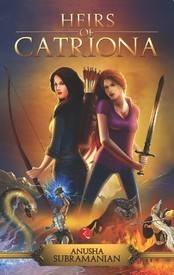
About the reviewer: Mrinalini Majumdar is all of 13, goes to school, is a brilliant student and a book worm. This book was given to her by me, her aunt, for I thought that she would like reading it. Coming up with a review was totally her idea. This review comes from someone who is the actual target audience for the book.
Nice review by Mrinalini on my daughters (ANUSHA SUBRAMANIAN's) book : HEIRS OF CATRIONA
February 23, 2013
Relearn : for the sake of your child.
The week gone by had been pretty hectic for me. Quite challenging too. And all that had nothing to do with my work life or with the books that I write. The challenge in fact was from unexpected quarters – Seventh Class Physics. Yes… you heard it right. Seventh standard physics. The last time those books tormented me was three decades ago. And now they have come back to haunt me. Three decades back, mind was young, and brain was fresh. It was easy to deal with it, and must confess without worrying about being modest, that three decades ago, I managed it deftly and conquered it effectively.
Over the last few days, as I read through the books trying to teach my daughter and help her prepare for the physics exams, I suddenly found myself inadequate. I knew what electrolysis was, broadly. But trying to explain and ensure that I don’t leave out even the smallest of details was a challenge. I knew how a dry cell worked. But I had forgotten that its made of a carbon cathode surrounded by Manganese dioxide and ammonium chloride electrolyte and a zinc container which doubles up as a anode. And for those who read this, do you remember how a domestic electric meter which is connected to your mains functions? Many of you, like me, would struggle to speak more than 5 sentences on it, I am sure.
I managed. Just about managed. I googled and read up quite a bit, to make sure that my daughter, who currently thinks that her father is probably the most intelligent man on planet earth continues to think so. Maths was easier to manage as a lot about maths is about fundamentals which once you learn, you seldom forget. And its about attitude (towards maths) too. And I have always believed in my mathematical abilities.
But today, I am proud that i managed to successfully teach Anusha what I wanted to. She knows how electricity is generated, What is the constitution of a dry cell, how electrolysis happens, whats an electrode, what is resistance, why is heat generated when electricity flows through a conductor, and what is Joules law (how many of you know it…….. H = I*I*R*t..where I is the amount of current in amps, which flows through a medium of resistance R ohms, for a time T secs… wow. I remember). She even knows how an electromagnet works.. I ripped apart the door bell to get her to understand principles of electromagnetism.
Sometimes I wonder, if i should give in to the prevalent practice of sending children to tuitions. Atleast they will learn from someone who is clued on to the current trends and will prepare them in a manner that they will do well in exams. But my only concern is will they ever be able to get todays children to have blind faith in what they tell them and hence learn from them — the same way as kids sometimes trust their parents. And most importantly will the tuition master be willing to rip apart his door bell to make sure his students understand electromagnets.

February 10, 2013
Salman, SRK to host Breaking News on Television.
I won’t be surprised if the next big development on television news comes with channels signing on ageing Bollywood stars as news anchors. In any case designer wear trotting, loud & acoustically unfriendly reporters have already started making their presence felt. Serious discussions happen in the fish market of news channel studios. Weird guests, having nothing to do with what is being discussed, have an opinion on everything from Mallika Sehrawats costume to the North Korean dictators smartphone.
Take yesterday for instance. Afzal Guru was hanged in the morning. All the news channels diligently covered it as breaking news for whole of Saturday. Someone please tell them that once broken, it stays broken. It ain’t breaking news anymore. But Naah.. I wouldn’t be surprised if even on Sunday the news channels report it as breaking news. Almost every channel without fail claimed that they reported it first… “You heard it first on our own channel”, every single news anchor screamed. The claim to reporting it first became, at certain points in time, more important that the event itself. As if Afzal Gurus hanging was not an important news for all viewers….but the fact that Times Now reported it first was of paramount national importance. Will someone please tell them that had I heard of Afzal Gurus hanging fifteen minutes later, it would have been fine with me.
Sad that histrionics have taken over news reporting these days. In the name of TRP’s, anything goes. Khap Panchayats are being run in the name of news channel debates. After the name of god, Arnab and Rahul have become the most uttered name in this country….at least on television. Histrionics in reporting is very much the name of the game. Sad that news channels don’t realise that if I want to watch drama I will go to a movie theatre or to watch a play.
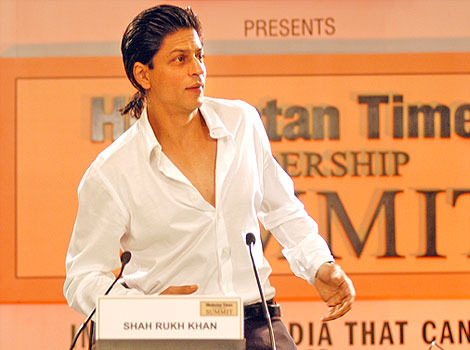
And what about music? The background score,as the news plays itself, will put an eighties Manmohan Desai – Bachchan film climax to shame. Why does a dramatic filmy music score play in the background when an event as ghastly as a rape is being reported? I don’t have an answer to this. While channels like BBC and CNN are also far from perfect, the Indian news channels can learn a trick or two from them in news coverage.
If they don’t, then I think the day is not far when Salman Khan will welcome the panelists on News Hour Debate..( maybe SRK will go to Headlines Today) and A R Rehman will compose music and original background scores for these TV Channels. And we will have awards ….not for the best breaking news coverage but for the most original breaking news music score. We will not have awards for the best news anchor ….but for the best actor in a news anchor role. We are closer to this day than you can ever imagine….and when it happens, please remember….. YOU HEARD THIS FIRST ON THIS BLOG.

Have a great Sunday

February 3, 2013
Fury of the FOG and the lesson learnt…
Late evening on Friday, I was travelling by car from Delhi to Agra, to attend the Taj Literary Festival. Driving on the New Yamuna Expressway was a pleasure. I was going to Agra for the first time and was quite excited about it. A few minutes into the drive, I got to know, through twitter of course that earlier in the day there was a massive pile up involving 30 cars, on the same expressway. Over 20 people had been injured. Delhi and its neighbouring areas, I would learn later, had experienced the heaviest fog for that year on Friday. Visibility had been near zero levels that morning. Thankfully by evening, which is when I was heading to Agra, the fog had cleared up and everything was normal.
We crossed Mathura. Hardly any traffic on the road. Clear visibility. Relaxed driver and a relaxed me. I got a call from the event organisers. I told them that I was about 60 to 70 km from Agra and that I would reach there in 45 minutes. Hardly had I spoken these words, that things began to change.
We did not know what hit us. It came all of a sudden and did not give us a chance to react. Suddenly, as if from nowhere, heavy fog descended. It came in waves. It seemed as if we were driving into a cloud. A moving, descending and a wavy cloud of white. Visibility went from 100% to close to 0% in less than 10 seconds. At a speed of 100 kmph it translated to about 275 metres for visibility going from full to nil. The driver was tactful, he brought the car to a near halt and thereon drove slowly and carefully. Picking up speed when the visibility improved and dropping speed when the fog hit us. ( the fog cleared and arrived at random). I was told that whenever we went past large tracts of farmland such a intermittent fogging was quite common…and often the cause of accidents.
But it was what the driver did on hitting the fog, that really got me thinking. He slowed down the car speed dramatically and went from high beam to low beam. Curious that a high beam would get him a better view of the area ahead, I asked him why he shifted to low. What he replied taught me a lesson in life. He said, “at a high beam, the light will be thrown up in the air. And in the low visibility caused by the fog, the dispersed light will be of no use. It will hardly show him anything that he cannot see without the high beam. On the other hand, the low beam/ normal beam focus all the light and throws it on the floor on the road right ahead of the car. Because of that he is clearly able to see the road, the white line on the road, and by following that at a slow speed, he would be much safer than following the path shown by the high beam of dispersed light. Simple isn’t it? Didn’t strike me. Probably I haven’t driven in a fog for long and hence didn’t know about it.
If I look back at our life, at various points in time, we face difficult foggy situations. And often we try to beat our way out of those situations with aggression, denial, and complete lack of focus. Instead we can learn from what the driver taught me. When encountered with difficult situations in life, it might do us a world of good to slow down our pace (so that we remain in control), switch to a more focused approach ( like he Low Beam of light, so that the path IMMEDIATELY ahead of us becomes visible and clear) and like the driver followed the white line on the road, we also follow a goal, a milestone, which is good enough to keep our head above water and progress ahead. And like my efficient driver cashed in by increasing speed whenever the fog cleared and before we hit the next wave, we too much cash in on opportunities life provides us and in the process be better prepared for the next phase of fog that can hit us anytime in this unpredictable life.




